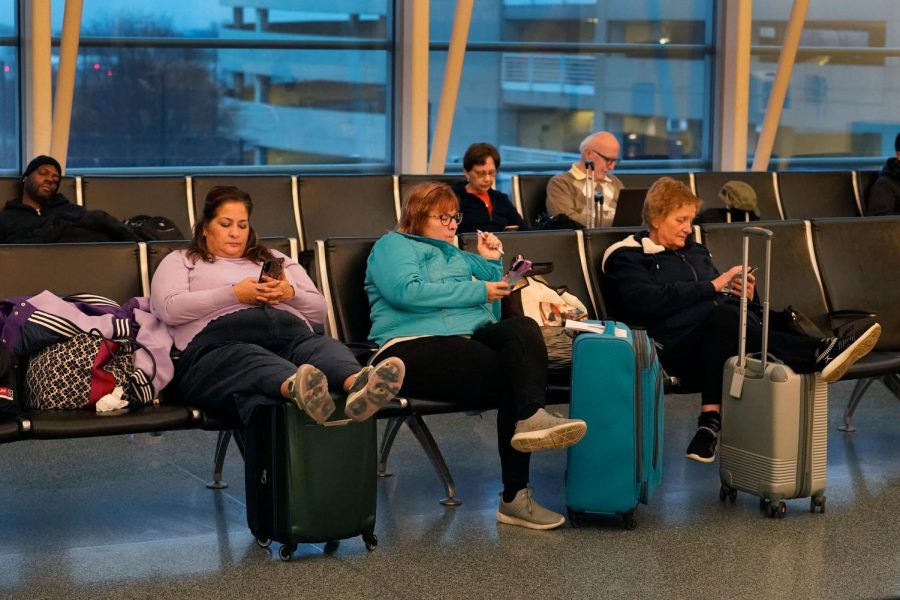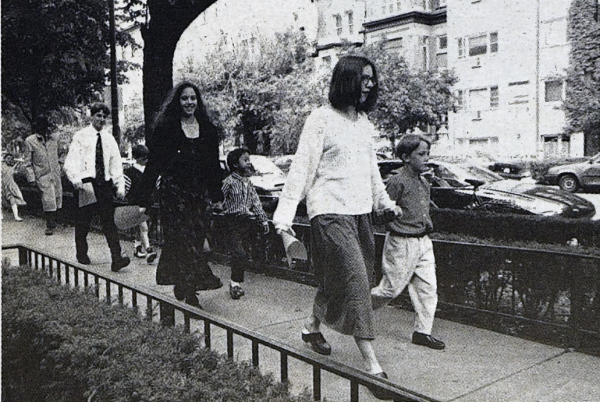Flight Chaos Beats the Grinch to Christmas
Travelers wait for flight at Chicago Midway International Airport.
As winter break slowly approached, students and teachers became anxious to leave midterms, essays, and Chicago’s notorious weather behind by catching a flight to warmer destinations. But winter had its own plans in store.
While some members of the Latin community reached their destinations ahead of Christmas, the holiday brought a full-on blizzard, covering most of the country in a cold white blanket. Beginning in the Midwest, the snowy weather traveled to the East Coast and spread unusually cold temperatures and rain to the South, including Florida—a popular travel destination for Latin families.
According to AAA, 113 million Americans traveled over the holiday season, but not without major hassles. One thing was clear: Winter break shaped up to be a perfect storm.
Interfering with their much-needed escape, hundreds of thousands of Americans were impacted by flight delays, cancellations, and lost luggage.
Many airlines determined the weather conditions were unsafe for flying.
Sophomore Andres De Marco said, “The problem was that because of the winter storm, all the people whose flights had been canceled were rebooked on [later] flights, and all flights were overbooked.”
Southwest Airlines, in particular, had exponentially more cancellations than other airlines. Delta, United, and American Airlines each had a couple dozen cancellations, but that was nothing in comparison to the 2,500 flights—62 percent of their flights—that Southwest canceled on December 21, just three days before Christmas.
The cancellations were due to Southwest’s unique “point-to-point” model instead of a traditional “hub-and-spoke” model. A “point-to-point” model allows for people to fly from smaller cities to their destination rather than going through a central hub. This means the next flight depends on the flight before it, so if one flight gets canceled, it impacts the rest. Conversely, with a “hub-and-spoke” model, there are usually multiple flights going to the same destination from the central airport.
On Andres’s way back from vacation, his Southwest flight was canceled, and his family had to split up to get back home.
“My dad and sister found two seats on a flight from Miami to Chicago. My mom and I couldn’t find anything until a flight to Chicago through Tampa showed up. Both our flight and my dad and sister’s flight got delayed by three hours, so we ended up leaving at 9 p.m. on Monday night,” he said.
With Chicago having two of the busiest airports in the nation—Midway and O’Hare—and many Latin students traveling, quite a few Romans experienced the chaos, whether directly or indirectly.
Brandon Woods, Upper School English teacher and Diversity, Equity & Inclusion Curriculum Coordinator, said, “As I was walking through [the Seattle Airport], I literally saw thousands of people who were just frustrated, people in their pajamas with pillows who clearly had slept at the airport, and there was this tangible feeling of frustration and anger. There were a lot of Southwest flights that went out of Seattle. It was dystopic.”
It was a slumber party at the airport, but not in a good way.
Sophomore Fran Santori flew on Southwest and experienced her own set of troubles. She said her family was stuck in the airport all night and had to sleep in a chair.
“I was halfway to Chicago. We were in the air for an hour and a half,” Fran said. “Then I hear the pilot on the speaker say we are turning back because of the weather conditions in Chicago. But they didn’t even bring us back to Miami. They dropped us off in Fort Lauderdale, where everyone got flights with multiple stops assigned to them for two days later.”
Fran added that on her way to Miami, though she didn’t have any cancellations, her luggage was mysteriously found open at baggage claim.
To make matters in the not-so-friendly skies even worse, a new COVID variant started to spread.
Instrumental Music Director Cynthia Gradek said, “I was scheduled to leave Charleston on Monday, December 26, but that flight was canceled, which worked out well because I had gotten COVID. The [Centers for Disease Prevention and Control] said I was safe to fly on Wednesday the 28th, so I rescheduled for that day with Southwest, and that flight ended up also being canceled.”
Ms. Gradek realized that Southwest was, yet again, an unreliable choice. She ended up paying an extra $300 to get home the next day on Delta Airlines.
With so many people facing flight cancellations, delays, re-routes, and layovers, it was difficult for airports to keep track of everyone’s luggage.
Sophomore Natasha Benjamin said, “[My family and I] connected in Miami on the way back to Chicago from the Cayman Islands, and one of our bags was lost. They didn’t let us board the flight without scanning all of our bags, so we ended up missing our connection.”
From cancellations and overnights at the airport to lost luggage and flight reroutes, the jet stream this year turned into the Grinch blowing in from the North.

Natalie Arora ('25) has been writing for The Forum since her freshman year and is thrilled to return this year as a Managing and Standards Editor. She...




















































